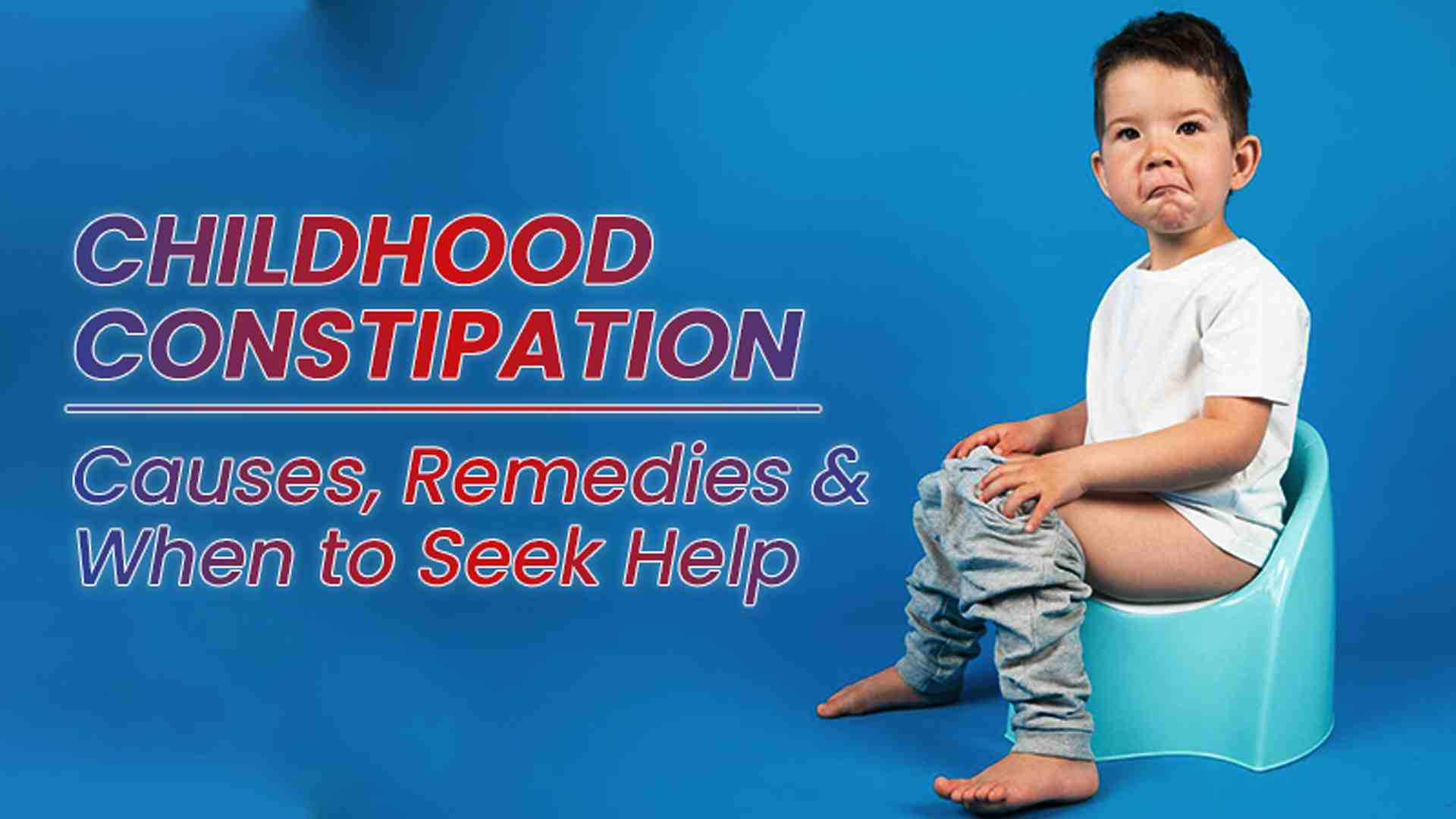Childhood Constipation: Causes, Remedies, and When to Seek Help
Verified By Dr. Vidyut Bhatia | 22-Nov-2024
Caring for a child often involves addressing a variety of challenges, and constipation is one of the most common concerns for parents. Constipation can be a challenging situation for both parents and their little ones. It often manifests as infrequent or painful bowel movements, hard or dry stools, and excessive straining. Sometimes, stools passed by the child may have blood. While occasional constipation is common, persistent constipation in babies can lead to discomfort and other complications.
Dr. Vidyut Bhatia, Sr. Consultant pediatric gastroenterologist at Kailash Hospital, Noida, emphasizes, “Childhood Constipation is often a result of dietary changes, but it can also signal underlying medical issues. Timely identification and treatment are essential to ensure your baby’s well-being.”
In this article, we’ll explore the causes, remedies, and treatments for childhood constipation, along with tips on when to consult a pediatric gastroenterologist.
Table of Content
Childhood constipation is characterized by challenges in passing stools or the occurrence of hard, dry stools, which can lead to pain or discomfort for the baby. Normal bowel movements can vary significantly among babies, with some passing stool multiple times a day and others only every few days.
There are several factors that can lead to constipation in babies:
- Dietary Changes: Introducing new foods, especially solid foods, can disrupt the delicate balance of the baby’s digestive system.
- Dehydration: Not drinking enough fluids can result in hard, dry stools.
- Medications: Some medications especially those used as cough syrups & painkillers may lead to constipation as a side effect.
- Medical Conditions: Underlying medical conditions like hypothyroidism or Hirschsprung's disease can play a role in causing constipation.
- Lack of Physical Activity: Limited movement especially in older kids can slow down digestion.
Dr. Bhatia states, “For many babies, constipation is a temporary issue linked to dietary or developmental changes. However, persistent or severe constipation should be evaluated by a pediatrician.”
Also read: How to get rid of constipation during pregnancy?
If your baby is experiencing constipation, you may notice the following signs:
- Infrequent bowel movements: Having fewer than three bowel movements each week.
- Hard, dry stools: Difficulty passing stools.
- Straining and crying during bowel movements often accompanied with blood.
- Loss of appetite: Constipation can lead to discomfort, which may decrease your desire to eat.
- Fussiness and irritability: Discomfort from constipation can make your baby fussy and irritable.
Dr. Bhatia emphasizes the importance of consulting a pediatrician if your child is dealing with on-going constipation. Addressing the issue early can help avoid complications and keep your baby comfortable.
Here are some remedies that may help relieve constipation in babies:
- Hydration: Provide additional breast milk or formula to ensure your baby stays well-hydrated.
- Dietary Adjustments: It is important to have a high fiber in diet.
- Bicycle Exercise: Gently move your baby's legs in a circular motion, similar to pedaling a bicycle, to help stimulate bowel movements.
- Warm Bath: A warm bath can help relax your baby’s abdominal muscles, making it easier to pass stools.
- Tummy Time and Massage: Promote tummy time or softly massage your baby’s belly in a circular motion to help stimulate bowel movements.
- Avoid processed food especially that made with refined flour (Maida).
Also read: Spotting Pneumonia in Newborns & Infants: Causes, Symptoms & Urgent Care Tips
In serious situations, it may be necessary to seek medical treatment:
- Medications: Pediatricians may recommend stool softeners or glycerin suppositories for short-term relief.
- Dietary Therapy: Tailored dietary recommendations to include high-fiber options for older babies.
- Monitoring and Tests: Diagnostic tests to rule out underlying conditions like food intolerances or anatomical abnormalities.
Dr. Bhatia advises, “Parents should avoid over-the-counter laxatives unless specifically prescribed by a pediatrician. It's important to always consult a healthcare provider before beginning any medication.”
To prevent constipation in babies, consider the following tips:
- Breastfeeding: Breast milk is the ideal nutrition for babies and can aid in preventing constipation.
- Introducing Solid Foods Gradually: Introduce solid foods gradually and observe your baby's tolerance. Try to include one solid food at a time & give the baby time to get used to the new food item.
- Hydration: Make sure your baby stays well-hydrated, particularly in hot weather.
- Regular Exercise: Regular exercise, including gentle tummy time and physical activity, can effectively stimulate bowel movements.
While occasional constipation is usually not a cause for concern, certain symptoms warrant medical attention:
- Blood in the stool.
- Persistent vomiting or refusal to eat.
- Distended abdomen.
- Constipation lasting more than two weeks.
Dr. Bhatia emphasizes, “If your baby shows signs of severe discomfort or if constipation persists despite home remedies, it’s essential to consult a pediatric gastroenterologist promptly.”
Also read: When to Worry about a Child's Nose Bleed?
If left untreated, chronic constipation can lead to serious complications:
- Painful bowel movements.
- Fissures or tears in the anal region.
- Impacted stool requiring medical intervention.
Kailash Hospital, Noida, is equipped with advanced facilities and a team of highly skilled pediatricians and gastroenterologists. Dr. Vidyut Bhatia, a leading pediatric gastroenterologist, specializes in diagnosing and treating childhood constipation and related conditions.
With a patient-centered approach, the hospital ensures comprehensive care for your baby’s health needs.
Childhood Constipation is a frequent issue that can be effectively managed. With the right combination of dietary changes, hydration, and gentle interventions, most cases can be resolved at home. However, if symptoms are persistent or severe, it's important to seek professional evaluation and treatment.
By understanding the causes and symptoms of childhood constipation, you can take proactive steps to prevent and manage this common issue. If you have any worries about your baby's bowel movements, it's best to reach out to a pediatrician for tailored advice and treatment.
For expert care, consult Dr. Vidyut Bhatia, Sr. Consultant Pediatric Gastroenterologist, at Kailash Hospital, Noida. Prioritize your baby’s comfort and health by addressing constipation concerns promptly.



 +91-9711918451
+91-9711918451
 international.marketing@kailashhealthcare.com
international.marketing@kailashhealthcare.com







